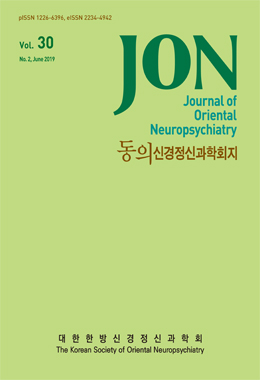Objectives: To conduct and report the results of a public health promotion program in Korean medicine (KM), namely the KM Visiting Care Service for Solitary Elderly, from November 2018 to April 2019.
Methods: Six elderly people living in a rural area received the KM visiting care service, twice a week, for four months. This service consisted of acupuncture, auriculotherapy, and supportive counseling to manage their musculoskeletal pain, cognitive impairment, and/or depression. The changes of symptoms were assessed using Numeric Rating Scale (NRS), Korean version of Mini-Mental State Examination for Dementia Screening (MMSE-DS), Korean version of Montreal Cognitive Assessment (MoCA-K), and Geriatric Depression Scale-Short form Korean (GDS-SF-K).
Results: Through the 4-months KM visiting care service, the overall subjects’ NRS-rated pain decreased slightly. Most showed improvement in MMSE-DS and/or MoCA-K, except one subject who was diagnosed with Alzheimer’s disease. Depression assessed by GDS-SF-K showed improvement in a few subjects who were unable to walk independently. Satisfaction assessed through survey was generally high in all subjects.
Conclusions: This KM Visiting Care Service for Solitary Elderly may help improve the pain and cognitive function of frail solitary elderly in rural areas. However, the protocol need to be improved to optimize the effect.




